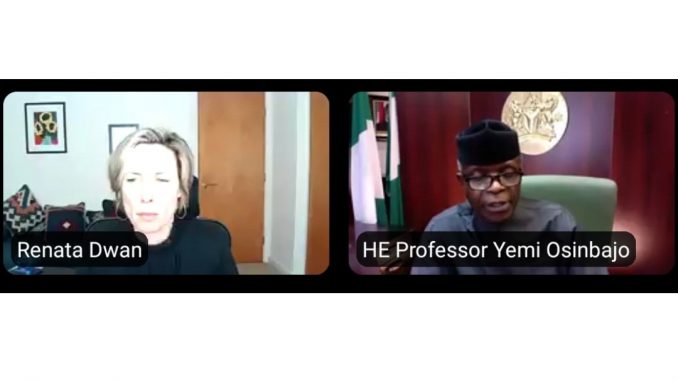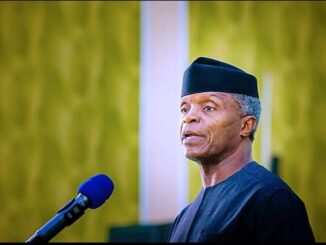
By Femi Popoola
Nigeria’s Vice President Yemi Osinbajo has stressed the importance of developing a national capacity to arrest health emergencies in the country.
He also reiterated government’s promise to be transparent in implementing most of its policies, especially in mitigating the fallout of the COVID-19 pandemic on the economy.
He spoke on Tuesday, during a webinar organized by Chatham House Africa with the topic “Priorities for Nigeria’s Post-COVID recovery.”
Prof Osinbajo, was of the view that politicians are generally viewed with distrust, said the government would try to change the narrative by embracing transparency and good governance for the Nigerian people.
His words “Politicians are possibly the most untrusted individuals and what this government is doing to bridge that gap is to ensure they always deliver on their promises and also to be as transparent as possible to the people.”
However, speaking further on government’s intervention to arrest the Covid-19 pandemic, he said, “We have expanded the footprint of our sovereign public health response capabilities. Going forward we are committed to building upon the exemplary dedication of our health workers and strengthening the capacity of our health system.”
He said one reason the government was able to manage the pandemic better than expected was that the country also had some existing public health infrastructure, which helped to strengthen its contingency plans and emergency response.
The Vice President said: “We sought to protect the most vulnerable, in particular the urban poor who were very hard hit. What we did was to provide direct cash transfers to the urban poor. In the first phase, we were able to benefit around 1 million beneficiaries.”
He informed that as part of the country’s recovery effort, the government had taken delivery of 4 million vaccine doses under the international COVAX scheme and commenced vaccination of Nigerians.
“These efforts and those of other African countries are proceeding under the spectre of vaccine nationalism,” Osinbajo that, “There are justifiable concerns, in my view, about the certainty of fair and equitable distribution of vaccines and that poorer countries may be left behind.”
ALSO READ: We’re mightier than challenges, Nigeria’ll surmount problems, Osinbajo assures
“In our globalised environment, national self-interest alone is insufficient to address the threat of a global pandemic. Any plan other than a global plan is bound to be counterproductive,” the, Vice President said.
On Corporate Affairs Commission (CAC), and the registration difficulty being faced by many Nigerians, the Vice President said he was aware of the current challenges faced by the CAC in registering of businesses.
He, however, assured that a lot of work was ongoing to resolve the challenges.
While answering question on the country’s external debt which was initially believed to be about 87 billion dollars, Prof Osinbajo, SAN, faulted the figure, saying, “Nigeria’s external debt is $32 billion with a domestic debt of about $50 billion, forming the bulk of what the country owes.
He further explained that an external debt of $32 billion shouldn’t create fear for a nation as great as Nigeria. He finally noted that the debt to GDP ratio is 21%.
On how to work through the debt, he added that the government is working hard to reduce interest payment on loans and also trying to balance local and foreign debt.
According to Osinbajo, most of Nigeria’s foreign debt is domestic debt against popular beliefs.
“The current debt of the nation is about $32 billion, and not $82 billion. To resolve this, government is working to improve revenue, reduce interest rate and rebalance the relationship between local and foreign debt. Also, the government is moving towards unifying the exchange rate,” Osinbajo said.
• Popoola reports from WEPUSH media.




